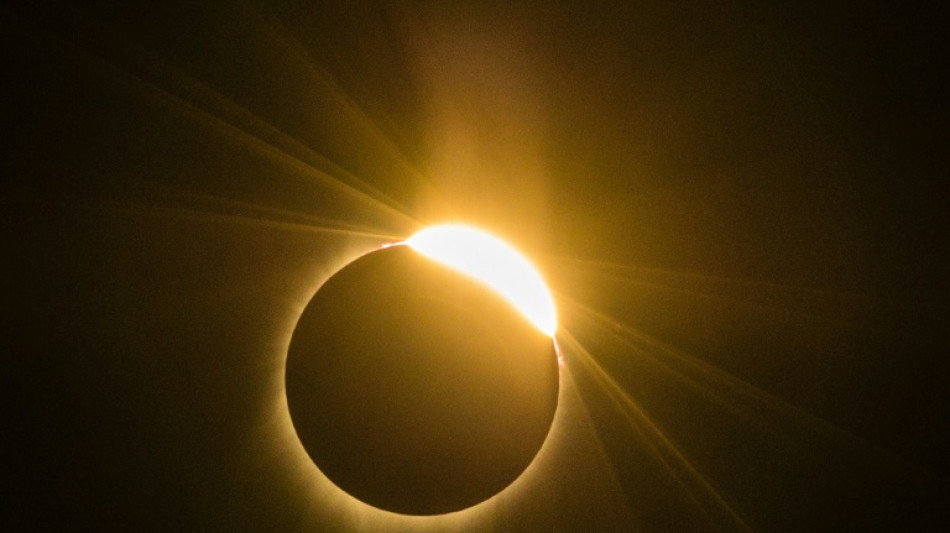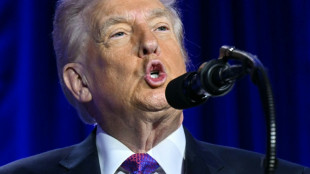
-
 Lindsey Vonn completes second Winter Olympics downhill training run
Lindsey Vonn completes second Winter Olympics downhill training run
-
Freeski star Gu survives major scare in Olympic slopestyle

-
 Iran FM looks to more nuclear talks, but warns US
Iran FM looks to more nuclear talks, but warns US
-
Hetmyer's six-hitting steers West Indies to 182-5 against Scotland

-
 After boos for Vance, IOC says it hopes for 'fair play'
After boos for Vance, IOC says it hopes for 'fair play'
-
Thousands gather as Pakistan buries victims of mosque suicide attack

-
 Lindsey Vonn completes second downhill training session
Lindsey Vonn completes second downhill training session
-
US pressing Ukraine and Russia to end war by June, Zelensky says

-
 Faheem blitz sees Pakistan avoid Netherlands shock at T20 World Cup
Faheem blitz sees Pakistan avoid Netherlands shock at T20 World Cup
-
Trump refuses to apologize for racist clip of Obamas as monkeys

-
 Takaichi talks tough on immigration on eve of vote
Takaichi talks tough on immigration on eve of vote
-
England's Salt passed fit for T20 World Cup opener

-
 Spain, Portugal brace for fresh storm after flood deaths
Spain, Portugal brace for fresh storm after flood deaths
-
Pakistan bowl out Netherlands for 147 in T20 World Cup opener

-
 Pushed to margins, women vanish from Bangladesh's political arena
Pushed to margins, women vanish from Bangladesh's political arena
-
Crypto firm accidentally sends $40 bn in bitcoin to users

-
 Pistons end Knicks' NBA winning streak, Celtics edge Heat
Pistons end Knicks' NBA winning streak, Celtics edge Heat
-
Funerals for victims of suicide blast at Islamabad mosque that killed at least 31

-
 A tale of two villages: Cambodians lament Thailand's border gains
A tale of two villages: Cambodians lament Thailand's border gains
-
Police identify suspect in disappearance of Australian boy

-
 Cuba adopts urgent measures to address energy crisis: minister
Cuba adopts urgent measures to address energy crisis: minister
-
Not-so-American football: the Super Bowl's overseas stars

-
 Trump says US talks with Iran 'very good,' more negotiations expected
Trump says US talks with Iran 'very good,' more negotiations expected
-
Trump administration re-approves twice-banned pesticide

-
 Hisatsune leads Matsuyama at Phoenix Open as Scheffler makes cut
Hisatsune leads Matsuyama at Phoenix Open as Scheffler makes cut
-
Beyond the QBs: 5 Super Bowl players to watch

-
 Grass v artificial turf: Super Bowl players speak out
Grass v artificial turf: Super Bowl players speak out
-
Police warn Sydney protesters ahead of Israeli president's visit

-
 Bolivia wants closer US ties, without alienating China: minister
Bolivia wants closer US ties, without alienating China: minister
-
Ex-MLB outfielder Puig guilty in federal sports betting case

-
 Milan-Cortina Winter Olympics open with dazzling ceremony
Milan-Cortina Winter Olympics open with dazzling ceremony
-
China overturns death sentence for Canadian in drug case

-
 Trump reinstates commercial fishing in protected Atlantic waters
Trump reinstates commercial fishing in protected Atlantic waters
-
Man Utd can't rush manager choice: Carrick

-
 Leeds boost survival bid with win over relegation rivals Forest
Leeds boost survival bid with win over relegation rivals Forest
-
Stars, Clydesdales and an AI beef jostle for Super Bowl ad glory

-
 Dow surges above 50,000 for first time as US stocks regain mojo
Dow surges above 50,000 for first time as US stocks regain mojo
-
Freeski star Gu says injuries hit confidence as she targets Olympic treble

-
 UK police search properties in Mandelson probe
UK police search properties in Mandelson probe
-
Bompastor extends contract as Chelsea Women's boss despite slump

-
 Milan-Cortina Winter Olympics open with glittering ceremony
Milan-Cortina Winter Olympics open with glittering ceremony
-
A French yoga teacher's 'hell' in a Venezuelan jail

-
 England's Underhill taking nothing for granted against Wales
England's Underhill taking nothing for granted against Wales
-
Fans cheer for absent Ronaldo as Saudi row deepens

-
 Violence-ridden Haiti in limbo as transitional council wraps up
Violence-ridden Haiti in limbo as transitional council wraps up
-
Hundreds protest in Milan ahead of Winter Olympics

-
 Suspect in murder of Colombian footballer Escobar killed in Mexico
Suspect in murder of Colombian footballer Escobar killed in Mexico
-
Colombia's Rodriguez signs with MLS Minnesota United

-
 Wainwright says England game still 'huge occasion' despite Welsh woes
Wainwright says England game still 'huge occasion' despite Welsh woes
-
WADA shrugs off USA withholding dues


What do scientists hope to learn from total solar eclipse in US?
When a rare total solar eclipse sweeps across North America on April 8, scientists will be able to gather invaluable data on everything from the Sun's atmosphere to strange animal behaviors -- and even possible effects on humans.
It comes with the Sun near the peak of its 11-year solar cycle, setting the stage for a breathtaking display: The corona will glow spectacularly from the Moon's silhouette along the path of totality, a corridor stretching from Mexico to Canada via the United States.
Total solar eclipses offer "incredible scientific opportunities," NASA Deputy Administrator Pam Melroy told a press conference this week about the celestial event.
The US space agency is one of the institutions at the ready for the eclipse, with plans to launch so-called "sounding rockets" to study the effects on Earth's upper atmosphere.
Here is a look at what researchers are hoping to learn from the upcoming eclipse:
- Sun's atmosphere -
When the Moon passes directly in front of the Sun and blocks it, the elusive outermost edge of the Sun's atmosphere, or corona, will be visible "in a very special way," Melroy said Tuesday.
"Things are happening with the corona that we don't fully understand," she said.
The heat within the corona intensifies with distance from the Sun's surface -- a counterintuitive phenomenon that scientists struggle to fully comprehend or explain.
Solar flares, a sudden explosion of energy that releases radiation into space, take place in the corona as do solar prominences, enormous plasma formations that loop out from the Sun's surface.
During an eclipse, the bottom most part of the corona -- where a lot of this activity occurs -- is more clearly visible than when using specialized instruments to block the central part of the Sun, offering a golden opportunity for study, said Shannon Schmoll, director of the Abrams Planetarium at Michigan State University.
Researchers are particularly thrilled about the Sun being near the peak of its 11-year cycle.
"The chance we're going to see something amazing is very high," Melroy said.
- Earth's atmosphere -
The total eclipse also will afford scientists a chance to study changes in part of the Earth's upper atmosphere known as the ionosphere, important because it affects radio waves used for communication and navigation.
"Disturbances in this layer can cause issues with GPS and communications," said Kelly Korreck, the eclipse program manager at NASA headquarters.
The ionosphere, which is where Earth's atmosphere meets space, is affected by the Sun, which electrically charges the particles there during the day.
NASA's three sounding rockets will be launched before, during and just after the eclipse from Virginia to measure these changes.
The major decrease in sunlight provoked by the eclipse -- more rapid and localized than a simple sunset -- should allow researchers to learn more about how light affects the ionosphere so they can better predict potential problematic disruptions.
- Animal behaviors -
Startling animal behavior has been noted during eclipses: Giraffes have been seen galloping, while roosters and crickets can start crowing and chirping.
Beyond the drop in sunlight, temperatures and wind -- conditions to which animals are sensitive -- can also decrease significantly during an eclipse.
Andrew Farnsworth, a researcher in ornithology at Cornell University in New York state, studies how eclipses affect birds, using weather surveillance radar to detect birds in flight.
During the last total solar eclipse visible from the United States in August 2017, scientists observed a "decline in the number of animals flying around," Farnsworth told reporters.
The 2017 eclipse disrupted the daily activities of insects and birds, but did not trigger usual animal nocturnal behaviors such as birds migrating or bats emerging, the expert said.
This time around, birds might be more apt to migrate during the eclipse, given that it's in April, he said.
"These kinds of patterns -- they're important for understanding the ways animals perceive their worlds," Farnsworth said.
- Human wonder -
"Eclipses have a special power. They move people to feel a kind of reverence for the beauty of our universe," NASA Administrator Bill Nelson told reporters.
Researchers studied this feeling of awe in 2017, using data from nearly three million users of Twitter, now called X.
Those in the so-called "path of totality" tended to use the pronoun "we" (as opposed to "I") and express concern about other people, according to Paul Piff, a professor of psychology at the University of California, Irvine.
"What we're finding is that experiences that bring about awe... seem to attune people and connect us to one another, to connect us to entities that are larger than ourselves," Piff said.
This year, he plans to study if the experience has any effect on political divisions in society.
- Citizen scientists -
About 40 citizen science projects are planned around the eclipse, from using a phone app to register the temperature and cloud cover to recording ambient noise during the event.
"We encourage you to help NASA observe the sights and sounds around you," Nelson said.
P.Tamimi--SF-PST

